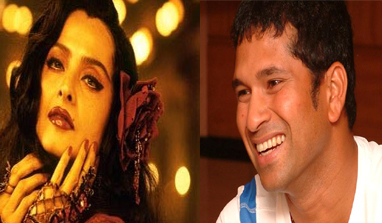
New Delhi, April 26: Cricket icon Sachin Tendulkar and actress of yesteryear Rekha are among four eminent persons who have been recommended for nomination as members of Rajya Sabha.
39-year-old Tendulkar, who has brought many a laurel to the country through his exploits in the game, and Rekha, known for her brilliant and emotional portrayals in Hindi cinema in the 80s, will become members of Parliament under a provision of the constitution that allows the President to nominate 12 members to the Upper House.
There is no word from the Government on who the other two are who have been nominated.
Prime Minister Manmohan Singh sent a communication to the Ministry of Home Affairs yesterday which has been sent to President Pratibha Patil for notification, sources said.
Article 80 of the Constitution provides for nomination of persons having special knowledge or practical experience in matters such as literature, science, art and social service.
57-year-old Rekha was one of the top heroines of the 80s in Hindi films and and had won several national awards in her acting career.
Tendulkar's nomination to Rajya Sabha has come as a surprise against the backdrop of a long-standing demand for conferring of Bharat Ratna on him for his contribution to the game. He completed the historic achievement of scoring 100 international centuries in March this year.
Earlier in the day, Tendulkar, accompanied by his wife Anjali, met Congress President Sonia Gandhi at her residence.
Tendulkar would be the first active sportsman and a cricketer to be nominated to Rajya Sabha. The House already has a member from the film world in Javed Akhtar, an eminent lyricist and script writer in Hindi cinema.





Comments
Add new comment